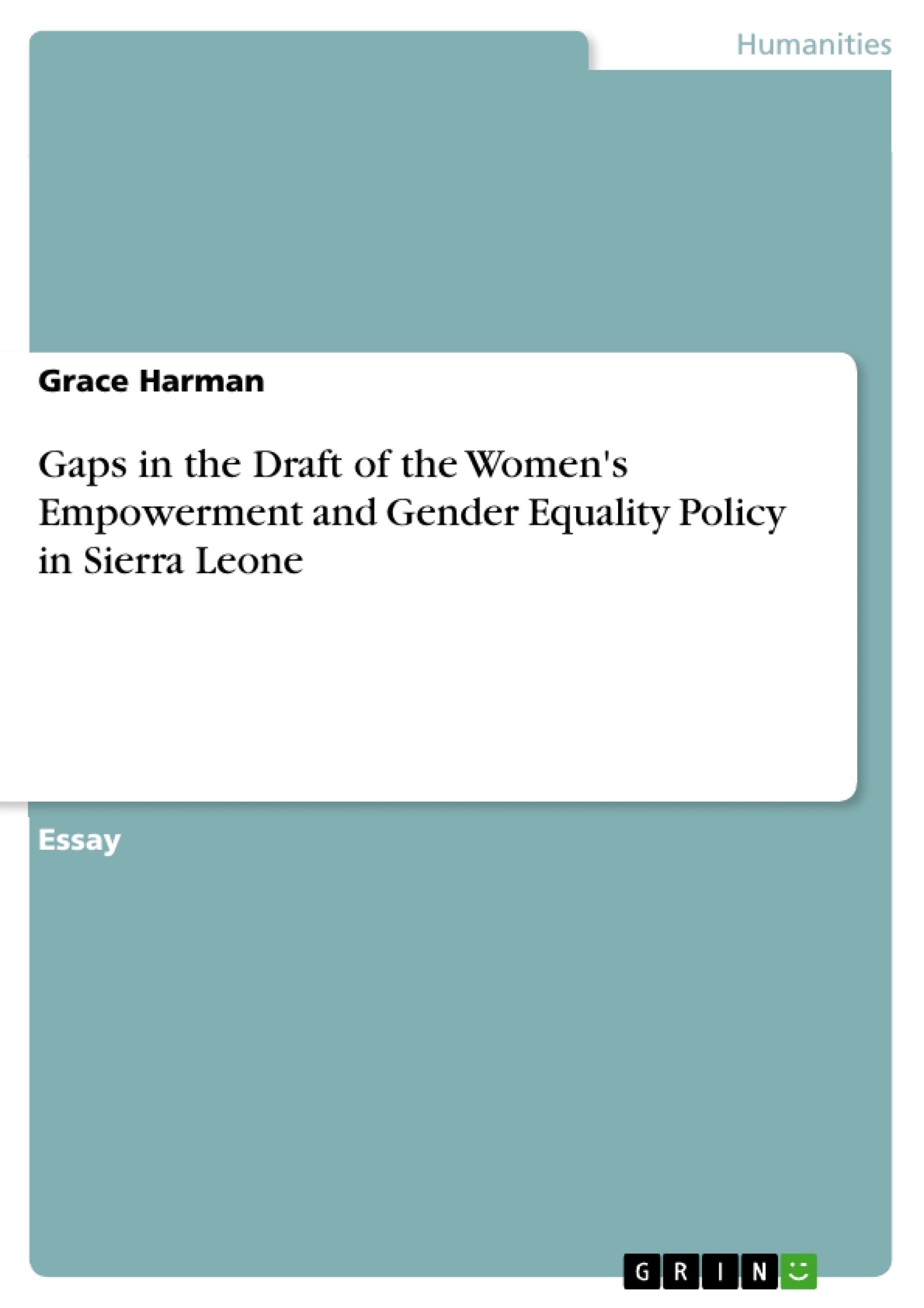In this essay the author gives a critical synopsis of the gaps in the latest draft of the Women’s Empowerment and Gender Equality Policy (WEGE) of Sierra Leona.
The author identifies low/weak budgetary allocations, weak/non-existent structures for its implementation and the pervading cultural and social barriers that consider women and girls as inferior to men and boys, as key constraints affecting the realization of gender equality plans and policies. The author proposes that the WEGE policy, if endorsed and supported as intended, will help address these and other barriers and enhance the attainment of gender equality results in all sectors in Sierra Leone. The WEGE policy is also expected to pave the way for a Gender Equality Bill to be passed into law in the immediate future.
The 2015 draft of the Women’s Empowerment and Gender Equality Policy has five parts covering the gender and development context in Sierra Leone; the policy context and legal frameworks related to gender; the WEGE policy rational and objectives; implementation and operational framework; forward looking short, medium and long term strategies. It proposes to be a policy framework to guide in the setting of standards for national and international actors towards attaining gender equality in the country.
Inhaltsverzeichnis (Table of Contents)
- Introduction
- Gaps
- Unclear direction
- Role duplication and multiplicity
- No clear targets set
- Too many structures for implementation
- Impact on Women
- Conclusion
- Reference
Zielsetzung und Themenschwerpunkte (Objectives and Key Themes)
The 2015 draft of the Women's Empowerment and Gender Equality Policy (WEGE) aims to establish a comprehensive framework for achieving gender equality in Sierra Leone. It seeks to address historical and institutionalized gender inequality and provide guidance for national and international actors in implementing strategies for achieving gender equality.
- Addressing historical and institutionalized gender inequality in Sierra Leone.
- Establishing a framework for achieving gender equality in all sectors.
- Identifying and addressing key constraints to the implementation of gender equality policies.
- Promoting gender mainstreaming and empowering women and girls.
- Developing a roadmap for achieving gender equality in Sierra Leone.
Zusammenfassung der Kapitel (Chapter Summaries)
The introduction of the WEGE policy provides a context for the policy by describing the gender relations and previous policies in Sierra Leone. It highlights the persistent inequalities faced by women and girls due to cultural and social barriers, as well as insufficient resource allocation. The WEGE policy is envisioned to address these challenges and pave the way for a Gender Equality Bill.
The chapter on "Gaps" identifies key limitations of the WEGE draft. It criticizes the document's length, repetitiveness, and potential to be overly academic and unattainable. The chapter emphasizes the need for a more concise and strategic approach to policy implementation, given the existing political and socio-economic realities of Sierra Leone.
The section on "Unclear direction" discusses the lack of concrete strategies to address the obstacles identified in the policy's situation analysis. The author emphasizes the importance of prioritizing actions and clearly defining objectives to ensure successful implementation. The chapter highlights the risk of overloading the policy with ambitious goals, potentially making it difficult to implement.
The chapter on "Role duplication and multiplicity" raises concerns about the proposed institutional arrangements and the potential for role confusion among key actors. The chapter criticizes the lack of clarity in mandates and accountability, leading to potential conflicts and inefficient implementation.
The "No clear targets set" section focuses on the absence of specific indicators for measuring progress on the policy. The author emphasizes the importance of clearly defined indicators to enable effective monitoring and evaluation. The chapter suggests that practical results for women should be directly evident in the policy.
The chapter on "Too many structures for implementation" criticizes the overreliance on bureaucratic structures at the expense of civil society organizations and women's organizations. The author argues that the focus should be on empowering these vital actors in the implementation process. The chapter also highlights the importance of involving development partners in supporting policy implementation and achieving gender equality targets.
The chapter on "Impact on Women" emphasizes the ambitious nature of the policy and its potential to significantly advance gender equality in Sierra Leone. The chapter highlights the need for effective implementation to achieve positive outcomes for women and girls.
Schlüsselwörter (Keywords)
Key themes and concepts explored in the document include: gender equality, women's empowerment, gender mainstreaming, policy implementation, institutional strengthening, resource allocation, cultural barriers, social norms, development partners, and civil society organizations.
Frequently Asked Questions
What is the WEGE policy in Sierra Leone?
The Women’s Empowerment and Gender Equality (WEGE) policy is a framework designed to achieve gender equality across all sectors and pave the way for a Gender Equality Bill in Sierra Leone.
What are the main gaps identified in the 2015 WEGE draft?
Key gaps include low budgetary allocations, weak implementation structures, unclear strategic direction, and a lack of specific indicators for measuring progress.
How do cultural barriers affect gender equality in Sierra Leone?
Pervasive cultural and social norms often consider women and girls as inferior to men, which acts as a major constraint to the realization of gender equality policies.
Why is the role of civil society important in this policy?
The author criticizes the policy's overreliance on bureaucratic structures and argues for the empowerment of civil society and women's organizations to ensure effective implementation.
What is the expected impact of the WEGE policy on women?
If effectively implemented, the policy aims to significantly advance gender mainstreaming and provide concrete improvements in the lives of women and girls in Sierra Leone.
- Quote paper
- Grace Harman (Author), 2017, Gaps in the Draft of the Women's Empowerment and Gender Equality Policy in Sierra Leone, Munich, GRIN Verlag, https://www.grin.com/document/513566



